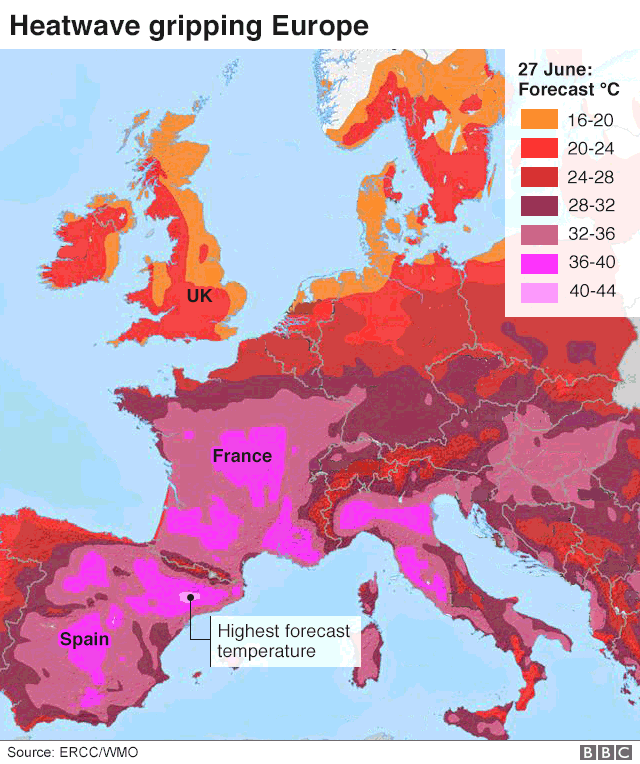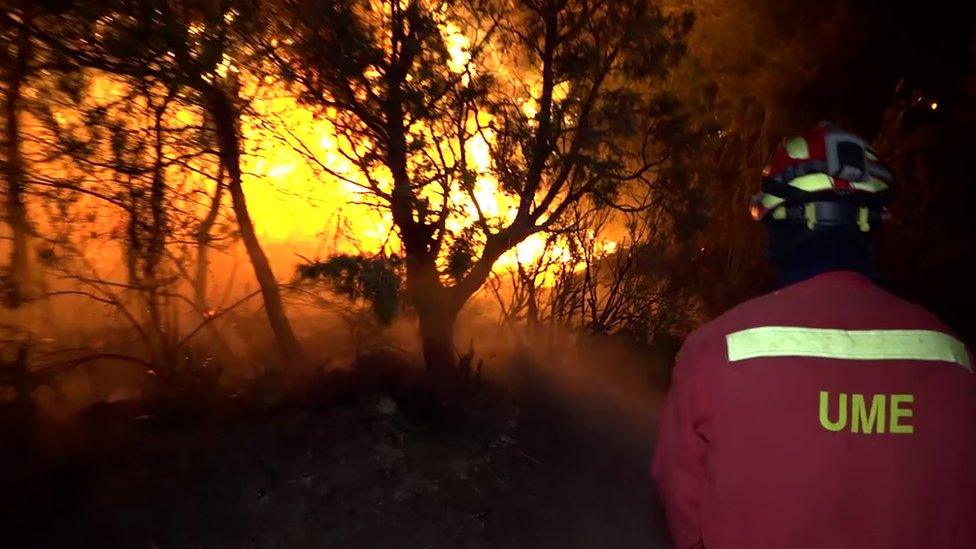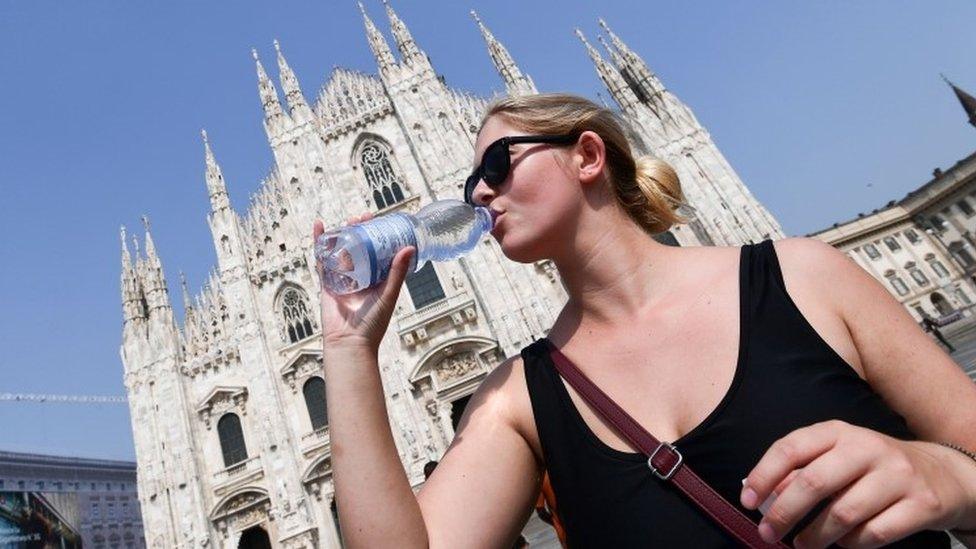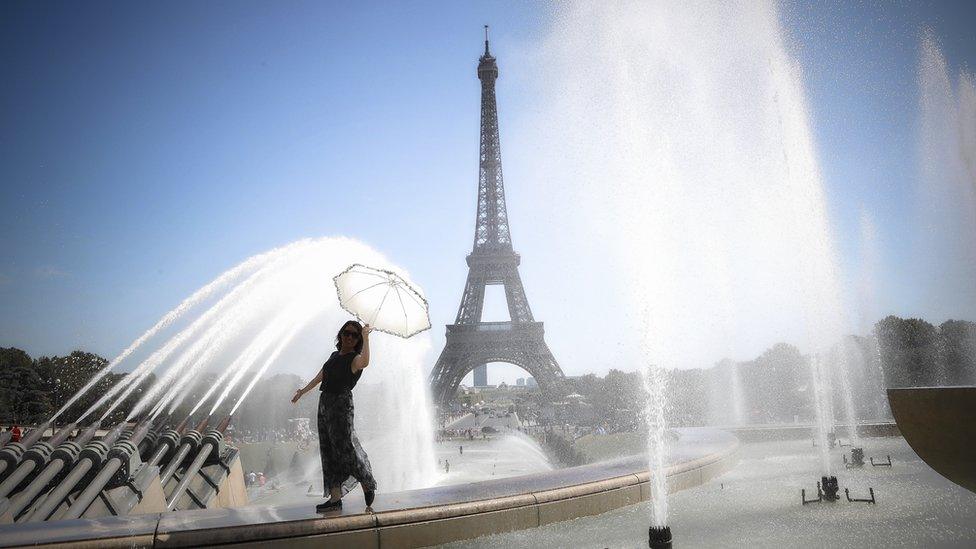European heatwave sets new June temperature records
- Published
Simon King explains the causes behind the heatwave
A heatwave affecting much of Europe is expected to intensify further with countries - including France, Spain and Switzerland - expecting temperatures above 40C (104F) later on Thursday.
On Wednesday, Germany, Poland and the Czech Republic recorded their highest temperatures for June.
Meteorologists say hot air drawn in from northern Africa is responsible.
The heat is expected to rise further in many countries over the next three days, meteorologists warn.
By early afternoon, temperatures had reached 37C in Turin in Italy, 39C in the Spanish city of Zaragoza, and 39C in Avignon in southern France.


In Spain, 11 provinces in the east and centre of the country are set to experience temperatures above 40C.
In parts of the north-east, they may reach 45C on Friday.

Firefighters are battling huge blazes in Catalonia
Hundreds of firefighters are battling wildfires in Catalonia, described by the regional government as some of the worst in 20 years.
At least 4,000 hectares (10,000 acres) are affected, but officials said that in the intense heat the area could increase to 20,000ha.
Thirty people have been evacuated and five roads have been closed.
Temperatures are expected to top 40C in Italy too, particularly in central and northern regions. Several cities, including Rome, have issued the highest heat warnings.

Milan also expects the mercury to top 40C on Thursday
On Thursday morning the body of a 72-year-old homeless Romanian man was found near Milan's central train station. Officials say the heat may have been a factor in his death.
Philip Trackfield, a British tourist in Rome, told the BBC: "Last night at the Spanish steps it was 41C. It's exhausting when you're trying to do all the sights."
Meanwhile the whole of France - where a heatwave in 2003 was blamed for 15,000 deaths - is now on orange alert, the second-highest warning level.
In Paris, fountains and sprinklers connected to hydrants have been set up. Some schools have delayed important exams and even closed.
In Toulouse, where temperatures are expected to reach 41C on Thursday, charities have been handing out water to homeless people.
BBC colleagues in hot countries give their tips for staying cool
The heat is also affecting France's 72,000-strong prison population. François Bes, a prison monitor, told BFMTV that many detainees had described their cells as "ovens".
"It's impossible to create a draught because by definition prisoners can't open the doors," he was quoted as saying. One major prison near Paris, Fresnes, has decided to hose down the yard to cool it, BFMTV reports.
How hot was Wednesday?
Temperatures have been climbing in recent days. On Wednesday, Coschen in Brandenburg peaked at 38.6C - a new German record for June.
Radzyn in Poland and Doksany in the Czech Republic also recorded new national highs, with temperatures hitting 38.2C and 38.9C respectively.
Even in the high-altitude Alps, temperatures topped 30C in places. Parts of Austria recorded their local all-time highest temperatures on Wednesday.
The Swiss cities of Geneva, Bern, and Zurich are all predicted to reach record temperatures of 39C or 40C.
A coati eating iced fruit in a Rome zoo
On Wednesday a swimming pool in the French city of Grenoble was shut down despite the heatwave, after a row over the use of a full-body Islamic burkini swimsuit, the mayor said.
While the UK will avoid the worst heat, parts of the country - including London - are expected to see temperatures top 30C on Saturday.
Is climate change to blame?
Linking a single event to global warming is complicated.
While extreme weather events like heatwaves occur naturally, experts say these will happen more often because of climate change.
Records going back to the late 19th Century show that the average temperature of the Earth's surface has increased by about one degree since industrialisation.
A climatology institute in Potsdam, Germany, says Europe's five hottest summers since 1500 have all been in the 21st Century.
Scientists are concerned that rapid warming linked to human use of fossil fuel has serious implications for the stability of the planet's climate.
- Published27 June 2019

- Published25 July 2019

- Published24 June 2019
